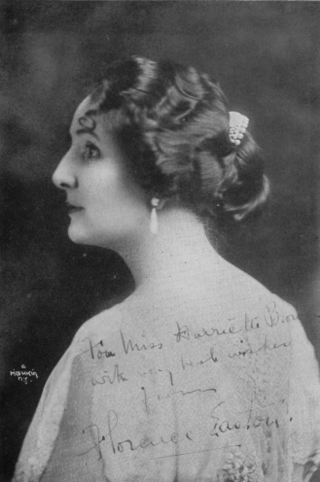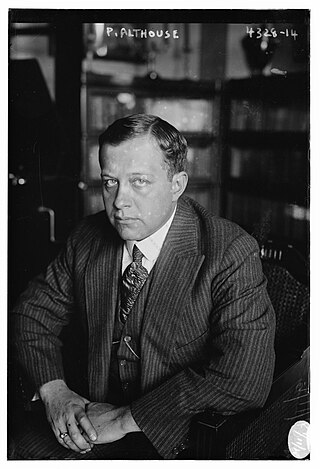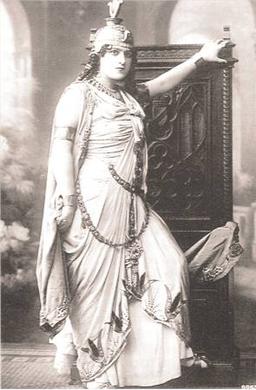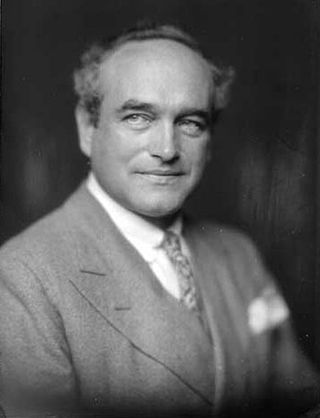
Otto Goritz (June 8, 1872 - April 13, 1929) was a German baritone with the Metropolitan Opera from 1903 to 1917. He then sang for the Hamburg State Opera. [1]

Otto Goritz (June 8, 1872 - April 13, 1929) was a German baritone with the Metropolitan Opera from 1903 to 1917. He then sang for the Hamburg State Opera. [1]
Goritz was born in 1872 in Berlin, Germany. Trained only by his mother, Olga Neilitz Goritz, Goritz debuted as Matteo in "Fra Diavolo" in 1895 at the Court Theatre in Neustrelitz, then sang at opera houses in Breslau and Hamburg.
In 1903, Goritz immigrated to the United States, where he sang with the Metropolitan Opera in New York City from 1903 to 1917. He performed in 25 roles at the Metropolitan, 24 of them in German and 1 in Italian. [2] After the USA entered World War I in 1917, the Metropolitan Opera suspended performances of works from the German repertory. Goritz was either fired or forced to resign from the Met after having been rumored to have sung a parody celebrating the 1915 sinking of the RMS Lusitania at a New Year's Eve party hosted by Met soprano Johanna Gadski in 1916 (Gadski also was forced out of the Met around the same time due to the war and her German links). [3] Goritz nevertheless remained in New York City. In late 1919, he organized the Star Opera Company and tried to stage German operas in German at the Lexington Opera House in New York City. After the American Legion gathered 23,000 signatures in protest and a riot broke out on opening night, the company was forced to disband. [4] In 1920, Goritz returned to Germany, where he continued to sing with the Hamburg State Opera. He died on April 13, 1929, in Hamburg. [1]
In the 1910s, Goritz made a number of recordings for Columbia Records, Edison Records, the Victor Talking Machine Company, and other companies. Some of them are available today on compact disc. [5]

Lauritz Melchior was a Danish-American opera singer. He was the preeminent Wagnerian tenor of the 1920s, 1930s, and 1940s and has come to be considered the quintessence of his voice type. Late in his career, Melchior appeared in movie musicals and on radio and television. He also made numerous recordings.

Elisabeth Schumann was a German soprano who sang in opera, operetta, oratorio, and lieder. She left a substantial legacy of recordings.

Johanna Emilia Agnes Gadski was a German dramatic soprano. She was blessed with a secure, powerful, ringing voice, fine musicianship and an excellent technique. These attributes enabled her to enjoy a highly successful career in New York City and London, performing heavy dramatic roles in the German and Italian repertoires.

Antonio Scotti was an Italian baritone. He was a principal artist of the New York Metropolitan Opera for more than 33 seasons, but also sang with great success at London's Royal Opera House, Covent Garden, and Milan's La Scala.

Heinrich Knote was an outstanding German dramatic tenor with an international reputation.

Louise Beatty Homer was an American operatic dramatic contralto who had an active international career in concert halls and opera houses from 1895 until her retirement in 1932.

Florence Easton was an English dramatic soprano of the early 20th century. She was one of the most versatile singers of all time, appearing in more than 100 roles, covering a wide range of styles and periods, from Mozart, Meyerbeer, Gounod, Verdi, Wagner, Puccini, Strauss, Schreker and Krenek. She sang virtually every Wagnerian soprano part, large and small, from Senta in Der Fliegende Holländer onwards, including Brünnhilde in Götterdämmerung.

Paul Shearer Althouse was an American opera singer. He began his career as a lyric tenor with a robust Italianate sound, in roles including Cavaradossi in Tosca, Pinkerton in Madama Butterfly, and Turiddu in Cavalleria rusticana. He later branched out into the dramatic tenor repertoire, finding success in portraying Wagnerian heroes. He sang with the Metropolitan Opera in New York City for 30 years.

Albert Reiss also Albert Reiß was a German operatic tenor who had a prolific career in Europe and the United States during century. He spent much of his career performing at the Metropolitan Opera where he sang in more than 1,000 performances, including several premieres, between 1901–1919. Excelling in the tenor buffo repertoire, Reiss was particularly associated with the roles of David in Wagner's Die Meistersinger von Nürnberg and Mime in Der Ring des Nibelungen, two roles he sang in numerous houses internationally.

Margarethe Arndt-Ober was a German opera singer who had an active international career during the first half of the twentieth century. A highly skilled contralto, Ober enjoyed a particularly long and fruitful association with the Berlin State Opera from 1907 to 1944. She also was notably a principal singer at the Metropolitan Opera in New York City between 1913 and 1917.

Pavel Ludikar was a Czech operatic bass who had a highly successful international singing career from 1904 through 1944. He began his career in his native country and by 1911 had arisen at many of the major opera houses in Europe. From 1913 to 1935 his career was mainly centered in North and South America. The peak of his opera career was reached at the Metropolitan Opera in New York City, where he was committed from 1926 to 1932. He returned to Europe in 1935 to assume directorship of the Neues deutsches Theatre in Prague, remaining there until the theatre was closed in September 1938 due to Nazi occupation, effectively ending his stage career. The height of his later years in Prague was his portrayal of the title hero in the world premiere of Ernst Krenek's Karl V in June 1938.
Dezső Ernster was a Hungarian opera singer who sang leading bass roles with the New York Metropolitan Opera from 1946 to 1963. In 1929, he created the role of Baron d'Houdoux in Hindemith's Neues vom Tage.

Anna Fitziu was an American soprano who had a prolific international opera career during the early part of the 20th century. Her signature roles included Fiora in L'amore dei tre re, Mimi in La bohème, Nedda in Pagliacci, and the title roles in Isabeau, Madama Butterfly, and Tosca. After her singing career ended, she embarked on a second career as a voice teacher. Among her notable pupils was opera singer Shirley Verrett.

Georgy Andreyevich Baklanoff, known as Georges Baklanoff was a Russian operatic baritone who had an active international career from 1903 until his death in 1938. Possessing a powerful and flexible voice, he sang roles from a wide variety of musical periods and in many languages. He was also highly praised by audience and critics for his acting abilities.

Edyth Walker was an American opera singer who had an active international career from the 1890s through the 1910s. She began her career performing roles from the mezzo-soprano repertory, but later successfully added several soprano parts to her repertoire as well. While she did perform in Italian and French language operas, she had a clear affinity for works in the German language. She particularly excelled in the operas of Richard Wagner. After retiring from the stage, she was active as a voice teacher in both France and the United States. Her voice is preserved on several gramophone recordings, made mainly for His Master's Voice, between 1902-08.
George Cehanovsky was an American baritone and language coach of Russian birth who had a close association with the Metropolitan Opera in New York City for six decades.
Robert Leonhardt was an Austrian operatic baritone who sang several notable roles with the New York Metropolitan Opera between 1913 and 1922. He made numerous recordings for major record labels, both in Europe and in the United States.

Johannes Sembach began his musical career in German operetta and achieved international fame as a leading tenor in German opera, especially the works of Richard Wagner.

Louis D'Angelo was an American bass-baritone of Italian birth who was particularly known for his performances at the Metropolitan Opera during the first half of the 20th century. He created roles in the world premieres of seven operas at the Met, including Marco in Puccini's Gianni Schicchi in 1917.

Marion Weed was an internationally-famous American opera singer with lead roles in the Metropolitan Opera, the Cologne Opera, and the Hamburg Opera. She was the Dean of Women and a Dramatic Instructor at the University of Rochester's Eastman School of Music.